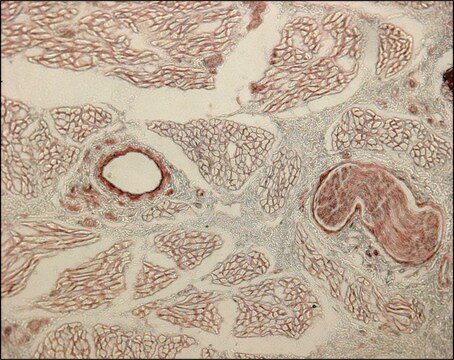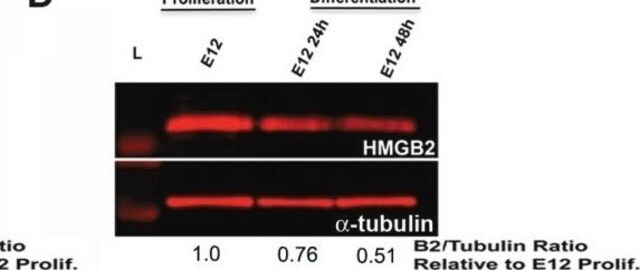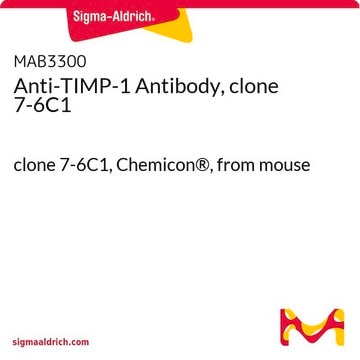MAB3310
Anti-TIMP-2 Antibody, clone 67-4H11
clone 67-4H11, Chemicon®, from mouse
Synonym(s):
Tissue Inhibitor of Metalloproteinase-2
About This Item
Recommended Products
biological source
mouse
Quality Level
antibody form
purified immunoglobulin
antibody product type
primary antibodies
clone
67-4H11, monoclonal
species reactivity
rabbit, goat, guinea pig, rat, human, bovine, mouse
manufacturer/tradename
Chemicon®
technique(s)
ELISA: suitable
immunohistochemistry: suitable (paraffin)
western blot: suitable
isotype
IgG1κ
NCBI accession no.
UniProt accession no.
shipped in
dry ice
target post-translational modification
unmodified
Gene Information
human ... TIMP2(7077)
Specificity
SPECIES REACTIVITY:
Cross-reacts with mouse, rat, guinea pig, rabbit and bovine TIMP-2.
Immunogen
YRGAAPPKQEFLDIED
Application
Immunohistochemistry on paraffin-embedded, PLP fixed tissue at 5 μg/mL (see Tomita reference) or frozen tissues at 1 μg/mL (see Ohashi reference).
ElA
Cell Structure
MMPs & TIMPs
Linkage
Physical form
Storage and Stability
Other Notes
Legal Information
Disclaimer
Unless otherwise stated in our catalog or other company documentation accompanying the product(s), our products are intended for research use only and are not to be used for any other purpose, which includes but is not limited to, unauthorized commercial uses, in vitro diagnostic uses, ex vivo or in vivo therapeutic uses or any type of consumption or application to humans or animals.
Not finding the right product?
Try our Product Selector Tool.
Storage Class Code
12 - Non Combustible Liquids
WGK
WGK 2
Flash Point(F)
Not applicable
Flash Point(C)
Not applicable
Certificates of Analysis (COA)
Search for Certificates of Analysis (COA) by entering the products Lot/Batch Number. Lot and Batch Numbers can be found on a product’s label following the words ‘Lot’ or ‘Batch’.
Already Own This Product?
Find documentation for the products that you have recently purchased in the Document Library.
Our team of scientists has experience in all areas of research including Life Science, Material Science, Chemical Synthesis, Chromatography, Analytical and many others.
Contact Technical Service








